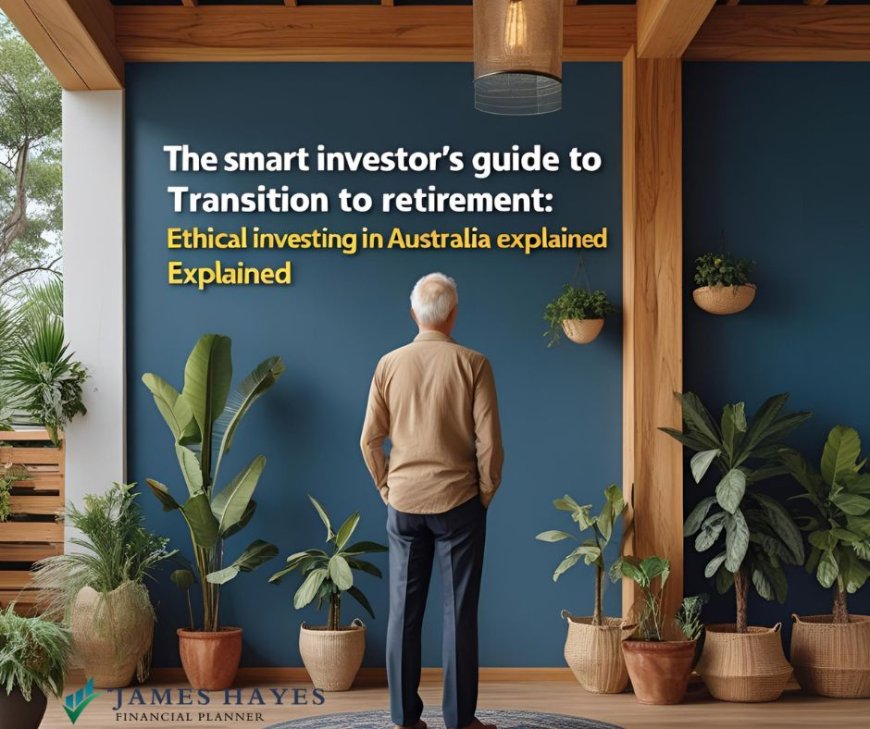The Smart Investor’s Guide to the Transition to Retirement: Ethical Investing in Australia Explained
Discover how to transition to retirement with confidence. Learn how ethical investing in Australia can align your values with smart financial planning. Insights from James Hayes, expert financial planner.

ntroduction: Aligning Purpose with Profit in Your Retirement Transition
Retirement is no longer just about withdrawing from workit's about stepping into a more meaningful chapter of life. As Australians approach the transition to retirement, many are asking deeper questions: How can I ensure financial security while making a positive impact? This is where ethical investing in Australia plays a crucial role. Ethical investing empowers retirees to support companies and funds that reflect their valueswhether its environmental sustainability, social justice, or corporate governancewhile still aiming for solid returns.
In this guide, we break down what ethical investing looks like for those approaching retirement and how expert advice from James Hayes Financial Planner can make your financial journey both profitable and purposeful.
Quick Tips for Ethical Investing During the Transition to Retirement
-
Choose ethical superannuation funds with strong performance histories.
-
Screen your portfolio for fossil fuels, weapons, and tobacco exposure.
-
Use ESG (Environmental, Social, Governance) metrics to evaluate investments.
-
Consider impact investing opportunities in areas like renewable energy.
-
Stay diversified to manage risk while aligning with your values.
-
Monitor annual ethical fund ratings (like those from Responsible Investment Association Australasia).
-
Plan for both income and longevity in retirement investing strategies.
-
Review ethical investment options with a qualified financial adviser like James Hayes.
-
Consider franked dividends and tax implications in sustainable portfolios.
-
Stay up to date with changes in ethical investment regulations in Australia.
Ethical Investing: A Rising Trend Among Australian Retirees
Ethical investing is no longer nicheits mainstream, especially among retirees in Australia. With more Australians seeking transparency and accountability in where their money goes, ethical investing offers peace of mind along with financial returns. The shift reflects a growing demand for values-aligned portfolios during the transition to retirement.
Why Retirement is the Perfect Time to Go Ethical
The transition to retirement often prompts a financial and personal re-evaluation. This is the ideal time to align your investments with your beliefs. Ethical investing allows retirees to support causes they care aboutlike climate action or human rightswithout sacrificing long-term returns.
What is Ethical Investing in Australia?
Ethical investing involves choosing assets based on their moral or social impact. In Australia, this often means avoiding fossil fuels, gambling, and tobacco, while supporting renewable energy, education, and health care. Funds are usually screened using ESG criteria and may be independently certified.
How to Find Ethical Super Funds in Australia
Superannuation is often the largest retirement asset. Switching to an ethical super fund in Australia ensures that your retirement savings are invested in companies with positive environmental and social impact. Look for funds with Responsible Investment Certification and clear exclusion policies.
Performance of Ethical Funds in Australia
Contrary to outdated beliefs, ethical funds often match or outperform traditional funds. In Australia, many top-performing super funds now have ethical investment options. These funds benefit from risk mitigation by avoiding industries with regulatory or reputational risks.
ESG Ratings: What Retirees Need to Know
ESG (Environmental, Social, and Governance) ratings help assess how well a company aligns with ethical principles. When planning your transition to retirement, ESG scores can help you choose investments that not only perform well but also contribute positively to society.
Risk Management Through Ethical Diversification
Ethical portfolios can be just as diverse as conventional ones. By including sectors like clean tech, healthcare, and sustainable infrastructure, retirees can mitigate risk while supporting innovation. Diversification remains keyeven within an ethical framework.
Ethical ETFs: A Smart Addition to Your Retirement Portfolio
Exchange-Traded Funds (ETFs) focused on ethical investing are a popular choice for retirees. They offer instant diversification and are usually low-cost. Look for ETFs listed on the ASX that exclude controversial sectors and include sustainability leaders.
Ethical Investing and Income Planning
Ethical investing can support your retirement income goals. Choose income-producing ethical assets such as dividend-yielding shares in clean energy, infrastructure, or socially responsible banks. Pair with bonds and term deposits for a balanced income stream.
Impact Investing: Taking It One Step Further
If you're looking to create direct change, consider impact investingwhere you invest in projects with measurable social or environmental outcomes, like affordable housing or renewable energy startups. Its a way to leave a legacy while earning returns.
Tax Considerations in Ethical Retirement Investing
Retirees must understand the tax implications of their investments. Ethical funds often include franked dividends and capital gains that can affect your tax situation. James Hayes Financial Planner can help optimize your retirement portfolio for tax efficiency.
Ethical Investing for Couples Transitioning to Retirement
If you're retiring as a couple, aligning investment goals is key. Ethical investing offers a shared sense of purpose. Discuss values together and choose funds that reflect mutual priorities, whether it's climate change or indigenous rights.
Avoiding Greenwashing in Ethical Investments
Greenwashingwhen companies falsely claim to be sustainableis a growing issue. Look for third-party certifications and transparent fund reporting. Working with a licensed adviser like James Hayes Financial Planner can help you avoid misleading products.
Local Investment Opportunities in Australia
Australia offers unique ethical investment opportunitiesfrom clean energy projects in Queensland to social housing in Melbourne. Investing locally can support your community while providing stable, long-term growth.
How Ethical Investing Supports Long-Term Financial Health
Investing ethically doesnt mean compromising on financial goals. Ethical investments often demonstrate lower volatility and better governance, making them attractive for retirement planning. They also reflect industries of the futureclean tech, not coal.
Working with a Financial Planner for Ethical Strategy
Navigating the transition to retirement with an ethical lens can be complex. Thats why working with a professional like James Hayes Financial Planner is invaluable. James specializes in retirement strategies that align financial security with personal values.
Aligning Your Will and Estate Planning with Ethical Values
As you plan your legacy, ensure your estate plan includes ethical guidelines. This might involve directing funds to ethical investments or charitable causes. An adviser can help structure this within your retirement and estate plans.
Ethical Investing for Self-Managed Super Funds (SMSFs)
If you have an SMSF, you have full control over investment choices. This allows for high customisation in ethical investing. Choose from ASX-listed ethical shares, green bonds, and even social enterprises. Get professional advice to manage compliance and strategy.
Ethical Investment Trends in Australia to Watch
From growing interest in ethical AI companies to divestments from fossil fuels, ethical investment in Australia is rapidly evolving. Staying informed on trends helps retirees adjust their portfolios for both purpose and performance.
Planning Ahead: Rebalancing Your Portfolio Post-Retirement
As you draw down funds, regularly rebalance your portfolio to maintain your ethical objectives and financial stability. This helps protect against market fluctuations while staying true to your values over the long term.
Frequently Asked Questions (FAQ)
What is ethical investing and how does it relate to retirement?
Ethical investing means selecting assets that align with your values. For retirees, it ensures your money supports causes you believe in while delivering strong returns.
Can ethical funds in Australia perform well financially?
Yes. Many ethical funds in Australia match or exceed the performance of traditional funds due to strong governance and forward-thinking industries.
Is ethical investing riskier than conventional investing?
Not necessarily. Ethical portfolios are often less exposed to industries with legal or reputational risks, offering long-term stability.
How do I know if a fund is truly ethical?
Check for third-party certifications like the Responsible Investment Association Australasia (RIAA) or ESG disclosures in annual fund reports.
What are the best ethical super funds in Australia?
Top ethical super funds include Australian Ethical, Future Super, and Verve Super. Each has strong ESG frameworks and performance history.
Can I include ethical investments in my SMSF?
Absolutely. SMSFs allow full flexibility to choose ethical stocks, ETFs, and other assets. Seek advice to remain compliant.
Are there tax advantages to ethical investing in retirement?
Ethical investments may provide franking credits and other tax benefits. Consult with James Hayes Financial Planner to structure efficiently.
Whats the difference between ESG investing and impact investing?
ESG investing screens for environmental and social responsibility, while impact investing seeks measurable positive outcomes alongside returns.
Should I consider ethical investing as a couple?
Yes. Ethical investing offers couples the opportunity to align shared values with long-term financial planning.
Where can I get help transitioning to retirement ethically in Australia?
Work with professionals like James Hayes Financial Planner, who specialises in ethical retirement strategies tailored for Australian retirees.
Read More:




































